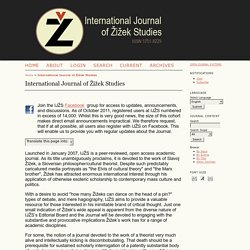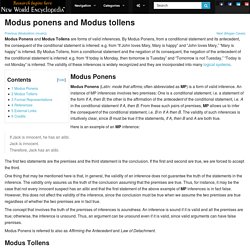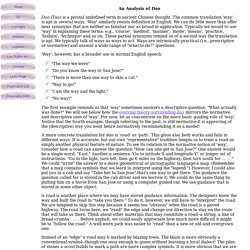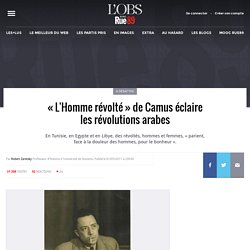

Andrés Velasco -Andrés Velasco. A.C. Grayling. President Elect Donald J. Trump. Donald J Trump for President. Home - Stratagem International. International Journal of Žižek Studies. Join the IJŽS Facebook group for access to updates, announcements, and discussions.

As of October 2011, registered users at IJŽS numbered in excess of 14,000. Whilst this is very good news, the size of this cohort makes direct email announcements impractical. We therefore request, that if at all possible, all users also register with IJŽS on Facebook. This will enable us to provide you with regular updates about the Journal. Launched in January 2007, IJŽS is a peer-reviewed, open access academic journal. With a desire to avoid "how many Žižeks can dance on the head of a pin? " For some, the notion of a journal devoted to the work of a theorist very much alive and intellectually kicking is discombobulating. Žižek is alive, which allows him to answer back. Žižek thus defies easy categorisation but the importance of his contribution to contemporary cultural theory is clear.
Libraries and philosophy. Trivium Education Home - Trivium Education.com. Saturday Morning Breakfast Cereal - Self-Driving Car Ethics. Philosophy and the Matrix - Return to the Source (Full Documentary) Modus ponens and Modus tollens. Modus Ponens and Modus Tollens are forms of valid inferences.

By Modus Ponens, from a conditional statement and its antecedent, the consequent of the conditional statement is inferred: e.g. from “If John loves Mary, Mary is happy” and “John loves Mary,” “Mary is happy” is inferred. By Modus Tollens, from a conditional statement and the negation of its consequent, the negation of the antecedent of the conditional statement is inferred: e.g. from “If today is Monday, then tomorrow is Tuesday” and “Tomorrow is not Tuesday,” “Today is not Monday” is inferred. The validity of these inferences is widely recognized and they are incorporated into many logical systems. Shang Shu : Zhou Shu : Prince Shi. About. The Internet Encyclopedia of Philosophy (IEP) (ISSN 2161-0002) was founded in 1995 as a non-profit organization to provide open access to detailed, scholarly information on key topics and philosophers in all areas of philosophy.
The Encyclopedia receives no funding, and operates through the volunteer work of the editors, authors, volunteers, and technical advisers. At present the IEP is visited over 950,000 times per month. The Encyclopedia is free of charge and available to all users of the Internet world-wide. The staff of 30 editors and approximately 300 authors hold doctorate degrees and are professors at colleges and universities around the world, most notably from English-speaking countries. Statement of Purpose The purpose of the IEP is to provide detailed, scholarly information on key topics and philosophers in all areas of philosophy.
Scholarly Standards The submission and review process of articles is the same as that with printed philosophy journals, books and reference works. Critical thinking web. Naturalism. An analysis of Dao (Tao) An Analysis of Dao Dao (Tao) is a pivotal undefined term in ancient Chinese thought.

The common translation 'way.' is apt in several ways. 'Way' similarly resists definition in English. We can do little more than offer near synonyms that are neither as familiar nor as broad in application. Typically we would to use 'way' in explaining these terms: e.g., 'course', 'method', 'manner', 'mode', 'means', 'practice', 'fashion', 'technique' and so on. 'Way', however, has a broader use in normal English speech: "The way we were" "Do you know the way to San Jose?
" The first example reminds us that 'way' sometimes answers a descriptive question. Camus par Sartre. Il y a six mois, hier encore, on se demandait: «Que va-t-il faire?»

Provisoirement, déchiré par des contradictions qu'il faut respecter, il avait choisi le silence. Mais il était de ces hommes rares, qu'on peut bien attendre parce qu'ils choisissent lentement et restent fidèles à leur choix. Un jour, il parlerait. Nous n'aurions pas même osé risquer une conjecture sur ce qu'il dirait. Camus homme revolte. « L'Homme révolté » de Camus éclaire les révolutions arabes. Albert Camus, 1957 (Robert Edwards/Wikimedia Commons).

Si l’auteur de « L’Homme révolté », publié il y a soixante ans, était toujours vivant, il dirait que les événements qui se déroulent aujourd’hui dans son Afrique du Nord natale nous rappellent que la Méditerranée a une rive sud dont la jeunesse incarne les principes de son essai : « La plus orgueilleuse des races, nous autres Méditerranéens », déclarait-il, « vivons toujours de la même lumière ». Alors que le monde plongeait dans les profondeurs glaciales de la guerre froide au début des années 50, Albert Camus ne pouvait trouver de chaleur intellectuelle ni à l’Est, ni même à l’Ouest. Son regard était fixé sur la Méditerranée, où « la jeunesse du monde se trouve toujours autour des mêmes rivages ». C’est tout sauf cela. Dans « L’Homme révolté », Camus nous donne les mots pour comprendre les événements qui bousculent notre monde.
Ils ne sont pas prêts pour la démocratie ? Facebook, Twitter... je me révolte, donc nous sommes. Jean-François Revel.